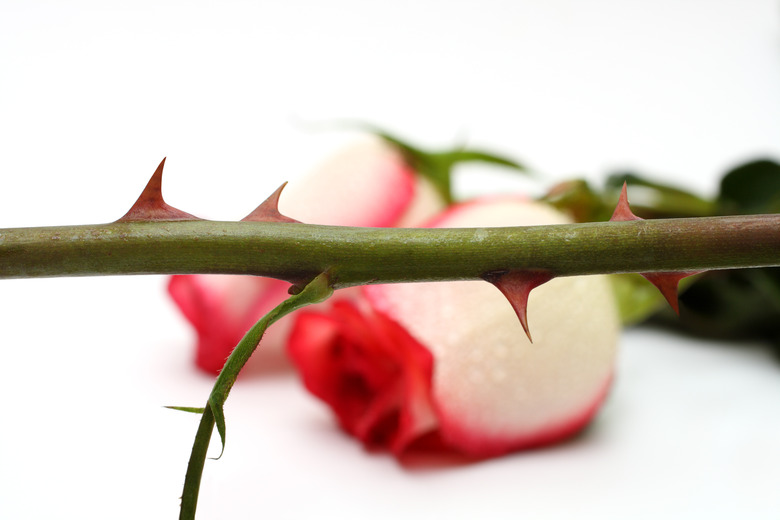Names Of Plants With Thorns
Thorns are simple plant defense mechanisms to deter any animal or person from handling the plant. Most people have had bad experiences with thorns while planting a garden, hiking through the woods or picking ripened berries. Despite their painful reputation, plant thorns can serve a useful purpose for homeowners.
Rose
Rose
Perhaps the most popular thorned plant is the rose. Often a metaphor for dangerous beauty, all roses belong to the Rosaceae family. These colorful flowers originated more than 4,000 years ago in the Middle East, and now enjoy immense popularity. Lasting up to 12 days in a vase, the rose is also popular for corsages, boutonnieres and wedding bouquets. Sharp thorns grow from the stem, some pointing upwards and others downwards.
Creeping Juniper Bush
Creeping Juniper Bush
Homeowners concerned with prowlers may use the thorny deterrent of juniper bushes to discourage any unwanted visitors. These flowering plants tend to grow outward, as opposed to upward, creating a painful wall of scaly thorns in front of house windows. Adaptable to different types of weather, juniper bushes do grow more tender with age, meaning they need to be replaced every so often to keep their natural defenses sharp.
Blackberry Bush
Blackberry Bush
Hikers often stumble upon a ripened blackberry bush and quickly learn to slow down their picking after receiving long scratches on the hand. These fruits are enjoyed by humans and animals, alike and are found in large bramble patches. According to Pat Tuholske of Healthy Planet magazine, blackberries also provide certain health benefits, including vitamin C, pectin, fiber and antioxidants.
Cite This Article
MLA
Kopf, Aaron. "Names Of Plants With Thorns" sciencing.com, https://www.sciencing.com/names-plants-thorns-6331808/. 13 March 2018.
APA
Kopf, Aaron. (2018, March 13). Names Of Plants With Thorns. sciencing.com. Retrieved from https://www.sciencing.com/names-plants-thorns-6331808/
Chicago
Kopf, Aaron. Names Of Plants With Thorns last modified March 24, 2022. https://www.sciencing.com/names-plants-thorns-6331808/
